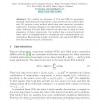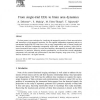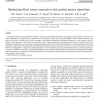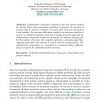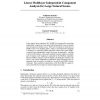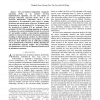397
click to vote
ICA
2012
Springer
13 years 9 months ago
2012
Springer
We consider an extension of ICA and BSS for separating mutually dependent and independent components from two related data sets. We propose a new method which first uses canonical...
141
click to vote
ICASSP
2011
IEEE
14 years 5 months ago
2011
IEEE
In this paper, we consider the problem of separating a set of independent components when only one movable sensor is available to record the mixtures. We propose to exploit the qu...
105
click to vote
IJON
2002
15 years 1 months ago
2002
We here present a new technique for visualizing the temporal dynamics of brain area activation and interaction at high-temporal resolution. We
135
click to vote
NN
2000
Springer
15 years 1 months ago
2000
Springer
ICA (independent component analysis) is a new, simple and powerful idea for analyzing multi-variant data. One of the successful applications is neurobiological data analysis such ...
113
click to vote
JCP
2007
15 years 2 months ago
2007
—In this paper, a neural network solution to extract independent components from nonlinearly mixed signals is proposed. Firstly, a structurally constrained mixing model is introd...
145
click to vote
IJON
2006
15 years 2 months ago
2006
This paper proposes a novel method for blindly separating unobservable independent component (IC) signals based on the use of a genetic algorithm. It is intended for its applicati...
132
click to vote
ICA
2010
Springer
15 years 3 months ago
2010
Springer
Independent Component Analysis is the best known method for solving blind source separation problems. In general, the number of sources must be known in advance. In many cases, pre...
121
click to vote
NIPS
2004
15 years 3 months ago
2004
In this paper, linear multilayer ICA (LMICA) is proposed for extracting independent components from quite high-dimensional observed signals such as large-size natural scenes. Ther...
141
click to vote
DAGM
2006
Springer
15 years 5 months ago
2006
Springer
Independent Component Analysis (ICA) is a frequently used preprocessing step in source localization of MEG and EEG data. By decomposing the measured data into maximally independent...
109
click to vote
CDC
2009
IEEE
15 years 6 months ago
2009
IEEE
The conventional independent component regression (ICR), as an exclusive two-step implementation algorithm, has the risk similar to principal component regression (PCR). That is, t...
